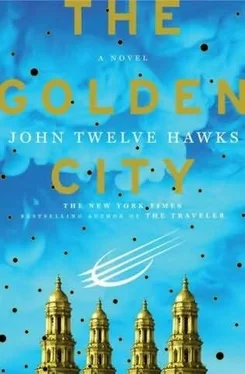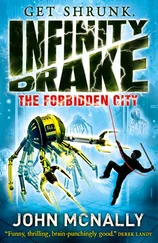Maya led Gabriel down a short hallway to a bedroom. “Now what?” he asked.
“We wait.”
“What if he finds us?”
“Then he’s going to get an unpleasant surprise.” She handed Gabriel the flashlight and pointed to the opposite wall. “You sit here. The moment he steps into the room, shine the light directly in his eyes.”
“And you?”
Maya pulled her sword out of its sheath and moved over to the doorway. “He’s carrying an assault rifle. I’m going to respond as fast as I can.”
Five minutes went by before the attacker kicked in the front door. Shoes thumped on the bare floor. The doors creaked open as the man searched house. He swore softly every time he found an empty room.
Footsteps. And then a dark form stood motionless in the hallway. Gabriel switched on the flashlight and Maya raised her sword.
“There you are!” said a familiar voice.
“Hollis! This is a surprise!” Gabriel laughed and lowered the flashlight. “How did you find us?”
“I crossed the border from Mexico and contacted Linden. He told me you were here.”
Maya stepped through the doorway. “It’s good to see you, Hollis. We could really use your help.”
“I’ve got a shotgun in the car and two safe mobiles. But we have to talk about one thing straight up. I’ve changed my name, Maya. Linden has accepted that change. I’m also asking for your permission.”
Gabriel looked confused. “What are you talking about? You don’t need permission to use a fake name. We’re all using cloned passports.”
“He’s not talking about passports.” Maya slid her sword back in its sheath. “What name will you be using?”
“Priest.”
“Do you really want this life, Priest?”
“I accept it.”
“Do you really want this death?”
“I accept that as well.”
She remembered Hollis holding hands with Vicki as they strolled down Catherine Street in New York City. Those two lovers were gone forever.
“Damned by the flesh,” she said softly.
“Yes,” Priest said. “But saved by the blood.”
It was rush hour when Boone drove over the Sepulveda Pass and returned to Los Angeles. Thousands of cars were edging forward on the freeway like sluggish blood cells in a clogged artery. Most people sat listened to music or the endless blathering of drive-time talk show hosts. Boone had monitored a few of these radio shows and was amused by the constant use of the word “freedom.” The new social order had nothing to do with freedom. It was more like a factory he had once visited in Hong Kong where carrot peelers glided by on a conveyer belt: a computer automatically picked out the anomalies, while the rest were boxed up to be sold.
For the last eight years, he had dedicated himself to destroying the Brethren’s enemies and establishing the Panopticon. Sometimes the work was dangerous or unpleasant, but he had experienced few moments of doubt or introspection. Now it felt as if the sky had cracked open like crystal globe. Boone tried to concentrate on the tasks before him-move into the exit lane, watch the car in front of you-but his rebellious mind kept raising questions. He was pleased when Carlos Ramirez called him on the cell phone. It was a welcome distraction.
“We got a problem, Mr. Boone. Doyle is sick.”
“He seemed all right this morning.”
“Yeah, I know. After he talked to you, we drove over to Culver City and checked into the hotel. Everything was okay until after lunch. Then Doyle said his stomach hurt and he went to bed.”
“Where is he now?”
“Still in bed, moaning and sweating a lot. Cannero and Riles are here with me. They were thinking that it might be some kind of disease that Doyle picked up in Thailand. You know-malaria or something like that. Should we take him to the hospital?”
“No.”
“Then what do we do?”
“Put some ice in plastic bags and place them near his neck or beneath his arms. I’m in the car right now. I’ll be there in ten minutes.”
Culver City was an incorporated city surrounded by the rest of Los Angeles. During World War II, it had been the location for most of the Hollywood movie studios, but only one of them remained. The Culver Hotel was a triangular brick building in the center of the downtown. It looked like a stogy grandfather surrounded by a chattering crowd of wine bars and hip restaurants.
Boone passed through the hotel lobby and took an elevator up to the two suites he had reserved on the eighth floor. No one answered when he knocked. Had his team already taken Doyle to the hospital? Why hadn’t someone called him?
The rooms had been paid for with a credit card from a shell corporation registered in the Cayman Islands. Boone returned to the lobby and presented the credit card to the young desk clerk. He received two key cards, returned to the eighth floor and entered the first suite.
Myron Riles, a former police officer from Texas, lay dead on the floor surrounded by a patch of blood. The second member of the team, Anthony Cannero, was sprawled on the couch with a bullet hole in the center of his forehead. The wall behind him looked as if someone had splattered red ink on the white plaster.
Boone drew his gun, approached the bedroom door and pushed it open. Carlos Ramirez was lying beside the bed with his head thrown back and a startled look on his face. Somehow Doyle had managed to grab the smaller man and keep him quiet while he broke his neck.
Then what? Boone returned to the suite’s living room and noticed that chunks of foam rubber and shreds of linen were scattered across the floor. Doyle had taken Ramirez’s gun and thrust it into a bed pillow: the pillow had muffled the shots when he entered the room. And now he noticed the other details: two wallets left on the rug and an empty money belt on the couch. Both mercenaries had been wearing jeans and their pants were dark with blood. Crouching down, Boone examined their wounds. After they were dead, Doyle had shot both men in the groin.
So where had he gone? The desert? That was the logical choice. Boone remembered the expression on Doyle’s face during the conversation that morning. I created a story for you. But the story needs an ending .
The suite seemed unusually quiet-a kingdom of the dead. Boone considered calling the police, then rejected the idea. His image had been captured by the hotel surveillance cameras, and he had spoken to two-no, it was three-hotel employees. The police would immediately decide that Boone was the prime suspect. As for Doyle, there was no longer any evidence that he even existed: during the last few weeks, the Evergreen Foundation computer team had systematically removed Doyle’s presence from the databanks in a half-dozen countries.
The killer had become a modern ghost, a creature that floated through the world like a phantom in a haunted house.
Boone retrieved the three wallets with their fake IDs, placed Do Not Disturb signs on both doors, and used the emergency staircase to leave the hotel. Driving north on residential streets, he passed a two-bedroom house that looked like a miniature castle and a cottage with a six-foot high crucifix planted in the front lawn. On Lincoln Boulevard, cars were lining up at a drive-through restaurant with a giant chicken standing on the roof. Stay calm , he told himself. What is the immediate objective? He needed the packets of money left in his room at the Shangri La Hotel. Doyle would be a few hours ahead of him, heading east to the Mojave Desert.
He called Lars Reichhardt, the director of the Berlin computer center. “I’m calling from Los Angeles. Do you recognize my voice?”
“Yes, sir.”
“Our three contract employees are no longer able to work for us in any capacity. The fourth employee, the one from Thailand, is no longer in contact with a supervisor.”
Читать дальше












